#air nomad genocide
Text
ppl who fail to comprehend anything about Aang’s character literally sound like this whenever they speak on him
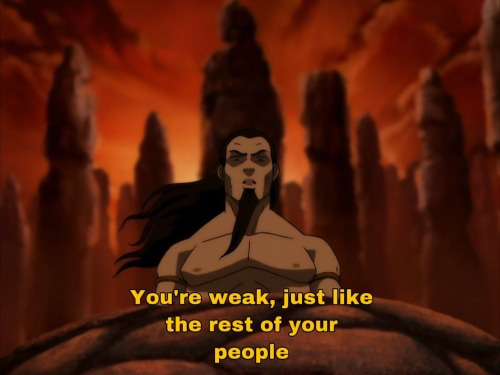
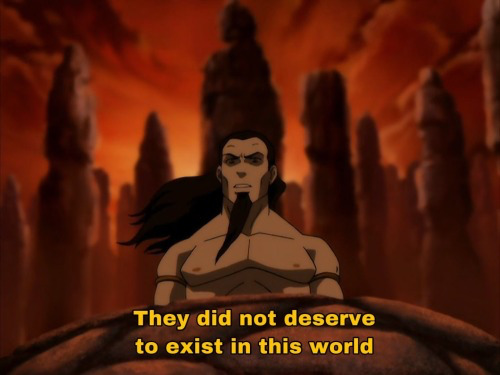
they’re always sayin shit that is borderline this dialogue lmao, like “oh he’s selfish” “oh he’s so weak” “I wish he would die” etc etc. like calm down Ozai Jr, I don’t think this show was meant for you!
#Aang#aang defense squad#aang deserved better#aanglove#Ozai#air nomad genocide#avatar the last airbender#atla
92 notes
·
View notes
Text
Yknow, i'm rewatching atla after reading the yangchen novels, and I really appreciate the small meaning behind some things a lot more now. In s3 e11 The Western Air Temple, combustion man shows up and wrecks the place. I always found this sad because the preservation of air nomad culture and architecture was something shown many times to be important to Aang, so the temple being destroyed is really tragic in that way. But also, Yangchen is a western air temple nun. And we can see statues of her there in the episode. So reading the novels and then seeing how her statue is focused on more at the western than any other is a nice touch that shows how much detail the og show had in it. These little nods to what eventually would become lore is amazing.
But as much awe as it inspires, theres symbolism without (imo) even trying to be. In the Yangchen novels, combustion bending is seen for the first time in the atla world, it was written as the biggest plot point and the worldwide threat of the novels. And we see Yangchen and her struggle against it. Things like Nujians death, Yangchens banishment, all of her struggles in the novels are some sort of result from her dealing with combustion benders. And she is from the western air temple. Which is salt in a centuries old wound. Yangchen, an air nomad, a pacifist by culture, who worked so hard to avoid taking lives when she was able, who lost so much because of combustion bending as a technique, who came from the western air temple,
Her home, was destroyed
By the very
Technique
That cost her so much already.
#yangchen#dawn of yangchen#legacy of yangchen#avatar yangchen#avatar aang#combustion man#sparkysparky boom man#avatar the last airbender#western air temple#air nomads#air nomad genocide
84 notes
·
View notes
Text
How must the average fire nation citizen have felt after Ozai's defeat and Zuko's subsequent coronation?
Like, you're a fire nation citizen. You're a farmer or a scribe or a shopkeep or whatever. A regular person. All your life you've been told that the century spanning war that's going on is a good thing. It's the fire nation spreading its civilisation to the rest of the world and making it better. You've been told that the other nations need to be made better, and you believe it because you've never known anything else to be true. You've never met someone from somewhere the fire nation hasn't controlled for most of the war so you assume that these things you've been told about the other nations, that they're savages and ignorant and need the fire nation's benevolent help to be better, are true because you don't know any better, and all of the firelords from Sozin onwards have done their hardest to convince you of that. You've never known a world that wasn't at war, one that your people have been wining.
You're told that the genocide of the air nomads was a good thing. They had an army. They were threatening the fire nation's safety. Of course the great firelord Sozin defeated them because they were a threat. This is a good thing. You don't question this because it's all you've ever been told, and it's all the firelords want you to know about it.
You're told that the other two nations, the water tribe and the earth kingdom, are savages, stupid and violent, dangerous to themselves and others. You're told that the war is a March of Civilisation, your nation is helping them to be better, less savage, less violent, less stupid, less of a danger. This is a good thing. This is all you know about the war.
One day, you're told the avatar has returned. You're told that he's a threat to your nation, that he's monstrous and dangerous and needs to be stopped. You're told he's travelling with some savages from the other nations that are equally as dangerous and bad and awful because they want to stop your nation from bringing peace and civilisation to the world. You don't like the avatar because this is all you know about him.
You're told that Princes Zuko and Iroh, the firelord's firstborn and the dragon of the west, have become traitors to the fire nation and are now wanted criminals. You're told of Zuko's lack of skill in firebending, his insanity after his father defeated him in an Agni Kai, his honour honourless existence after he questioned the firelord. You're told of Iroh, the previous dragon of the west and general in the army, how he went insane after the death of his son and betrayed the nation. You think that they are bad, because they are traitors to the nation, dangerous criminals. You never consider why they changed sides because, to you, the fire nation is a good thing. What your nation is doing is a good thing. This war is a good thing.
Ozai is defeated on the day that you've been told he will take the earth kingdom and help them be better.
You're told that of new firelord, Zuko, who you had been told previously was a traitor, who allied with the avatar to defeat Sozin, his father, was, in fact, right to betray the fire nation. You're told the ugly truth about the war that you always thought was a good thing. You're told about the air nomad genocide, the near total eradication of southern water tribe, the torture of prisoners of war, the deaths of so many earth kingdom people, the deaths of every young man sent to fight for his nation on either side of the war, the casual cruelty of the fire nation soldiers to those under their thumb, the horrors commited by your nation and you realise that no. Your nation is not good. Your firelords were not good. You are not good.
You hear about the deaths of so many innocents, their blood staining your nation red.
How do you move on from the total destruction of everything you thought to be true? How do you cope with the horrible reality of it all? What do you do now you know?
So, yeah. I wonder how the average fire nation citizen must have reacted to Ozai's defeat and Zuko's coronation.
21 notes
·
View notes
Text
Eric Nam being casted as Aang is quite literally so disgusting. How are you going to get a person supporting genocide to play someone that is a VICTIM of GENOCIDE??
#aang#there is no way Eric nam of all people is going to play Aang#it’s disgusting#it’s disrespectful#atla#avatar the last airbender#not my aang#air nomad genocide#palestinian genocide#the casting directors are either incompetent or straight up has no idea what avatar is about#the fact that they hired a known Zionist is borderline evil
8 notes
·
View notes
Text
I've been hearing a lot of people say that Ozai in the Avatar: the Last Airbender cartoon isn't supposed to be "developed" because he's a "symbol". My problem with this is that a character can both be well-developed and a symbol at the same time, so why choose otherwise? "It makes sense because he's supposed to represent" doesn't justify leaving the writing a little loose.
In the cartoon, Ozai is hardly a character to sink your teeth into. You can surmise and speculate things about him, but ultimately every discussion was more about Zuko or another character overcoming him and how satisfying that was than any character depth of Ozai himself. On the Day of Black Sun, Zuko and Ozai's confrontation is less an argument and ideological battle with layers between two human beings and more an extremely developed character yelling at an evil cardboard cutout.
The Problem With Ozai
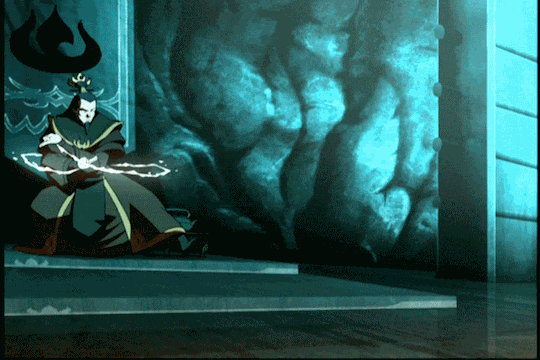
Zuko: "It was cruel and it was wrong."
Ozai: "Lol."
Zuko: "We need to replace this era with an era of peace and kindness."
Ozai: "Lame." (*scowls in annoyance, tries to leave*)
Zuko: "Stay or I'll cut you." (*waves swords*)
Ozai: "Fine. Whatever. Go on" (*proceeds to sit back down and wonder if he's having spiced fire rice cakes for dinner*)
The way the cartoon presents it, Ozai just was a bit too a moustache-twirling villain and that's even considering his actions. It's not even him being morally bankrupt or sadistic, but that his entire character only exists on the surface level. Him being "superficial" and "ruthless" isn't even a character trait because he has no real character beyond "I'm arrogant, selfish and evil". Even some of the worst dictators in human history from Hitler and Stalin to Mussolini and Mao have more complex 'psychological depth' than Ozai, despite committing the most evil and awful acts against other human beings.
I got they want to reflect the toxicity of the Fire Nation with him as a symbol, "fear" and "ruthlessness", but these are symptoms and the result of an ideology, and Ozai and this ideology need a bit more than "The Fire Nation's ideology is that they're superior, share the greatness and just kill people". We never see Ozai really talk about this ideology, how he is *civilising* the other nations (well, besides, setting them on fire). Why does he think Fire is superior? Why does the Fire Nation? We can speculate it's the unity of the Fire Nation and its industrialisation, that maybe the Fire Nation thinks they have better tea ceremonies and cleaner cities, but none of the Fire Nation characters really talk about this. Sharing their 'greatness', how?
And, of course, we know and the show know their 'greatness' is a lie and farce really, but for their citizens to buy into this farce realistically for 100 years, sending sons and even daughters to die for it, presumably working in factories endless hours to keep up war production like that giant drill, one would think the smokescreen would be a little more convincing than a couple lines. Yes, in the Headband, they show the kids are taught a warped version history with the Air Nomad army, but what is the unifying ideology of the Fire Nation exactly? And how does this reflect Ozai? Beyond ruthlessness and being a smarmy jerk?
And this brings me to a scene I have quite a problem with. The War Meeting flashback in Sozin's Comet Part 1, essentially Ozai just goes from 'How do we quell rebellion?' to 'We will destroy their hope by killing them all with fire'. Hehe, well, I mean, why even talk about "destroying hope" when they'll be too dead to despair? Of course, Sokka says after hearing that literally "I always knew the Fire Lord was a bad guy, but his plan is just pure evil". Then they throw in an Ozai baby picture to pretend they have some nuance, and then blah, blah, Energybending turtle appears out of near nowhere.
A Better Ozai
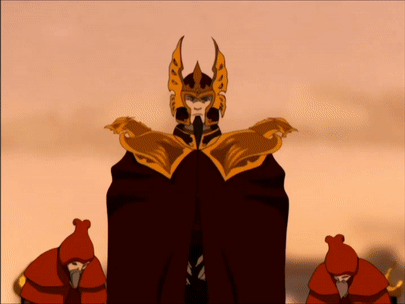
(I want it noted how hard it was to get a decent gif of cartoon Ozai, especially in his Pheonix King regalia. That is how little people care about or are interested in him. There is more Daniel Dae Kim gifs from the live-action than the cartoon version)
The funny thing is Ozai burning the Earth Kingdom could have worked if they actually gave him character arc in the cartoon. Have Ozai start out believing he can civilise the Earth Kingdom, who he views as inferior and needing to be kept in check. We see in the show Earthbending is banned in Fire Nation colonies and annexed territory, but they should also show him introducing policies to ban certain styles of Earth Kingdom dress, specifically their green national colour dress, and customs, forcibly *civilising* these territory with authoritarian laws. Earth Kingdom children have to go to Fire Nation school to be indoctrinated in how their cultures and homes are inferior, and told to report on their parents.
However, as time goes on, Ozai becomes increasingly disenfranchised with the war, as colonised Earth Kingdom citizens continue to resist, Earthbend and continue banned cultural practices in secret. He feels rising disgust at these people's Earthbender stubbornness and 'backwards' practices, resisting engaging in and conforming to Fire Nation's 'superior' cultural practices, science, and education. How dirty they are, so unFire-Nation, he thinks more and more. He begins to unravel in his hate and think to himself things like how "You just can't take the root edge out of people, so I should burn the root to the ground. Make the world clean, pure and Fire Nation".
If they showed Ozai in the cartoon shifting from the standard position of his father Azulon to an even more extreme and horrifying position over time, reacting in all the worst ways to whatever the world throws at him increasingly and increasingly, his turn as the Pheonix King could have been far more chilling. Azula isn't the only one who has to go "crazy" due to the Fire Nation's twisted teachings. It would have further emphasised the cycle of toxicity in the Fire Nation that Sozin set in motion.
Imperialism and fascism is often driven by a number of things in conjunction, commonly economics, but also vain pride, fear and discomfort; pride of your own nation at the expense of others, as well as fear and discomfort of others, how 'different' they are, their 'weird illogical customs' diluting the 'pure culture of yours' that you understand, their 'strange appearances' changing the face of the culture you know, that you like and think is the greatest and should be eternal. They could be spies, enemy agents of chaos and degeneration. They need to be 'civilised' or 'exterminated' to silence conflict and bring order, this 'dark horde' of backwards people who just can't ever be allowed to be 'in charge'. I think a weakness here is that Ozai is never shown to show any discomfort, he's just so confident and evil about everything, but if he were to reflect the dark face of the Fire Nation, a people they say aren't wholly evil demons, he does a bad job showing the twisted human face of evil and it makes him irrelevant in a way as a character with the themes other than "Defeat evil guy".
Lessons Taught Improperly
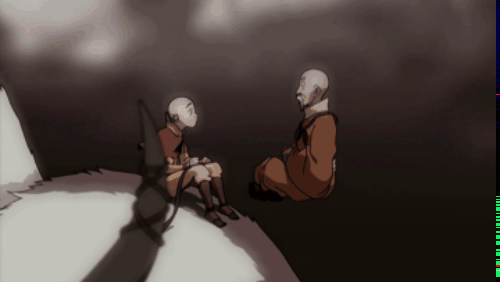
Now some would try to defend Ozai in that Avatar: The Last Airbender is a kid's cartoon, but I would say that makes it more important when discussing real-life issues. What is the point of lesson if it is taught improperly? Sometimes that can do more harm than good.
Avatar includes a number of mature themes, including the genocide of Aang's entire people and Gyatso's skeleton. Judging by the Tibetan influences in Air Nomad culture, a real-life people who have also been genocided, I think it is necessary and good practice for even kid's shows to make sure the lessons on real-life evils like the concepts and systems of imperialism, colonialism and nationalism are taught well. Because otherwise you get an inaccurate picture of what it is and how it actually works, and what is the point of that?
Stories want to impart lessons on things being "bad" as a message, but often I think they fall short in getting to the point of why they happen. I wonder if that makes them a little pointless in a way, because the reasons why characters/people and nations do things is both important to good writing and real life. If you aren't taught it properly, how well can you recognise it in your own country? And if you can't, then hasn't the lesson failed to be imparted?
#avatar legend of aang#avatar the last airbender#atla ozai#fire lord ozai#fire nation#imperialism#colonialism#air nomads#atla aang#atla gyatso#air nomad genocide#prince zuko#fire nation royal family
6 notes
·
View notes
Text
When I watched ATLA as a kid I fully expected that in an epilogue or the comics or something Aang was going to find out that the world was about to lose bending. All bending. I really thought that was the post canon story arc; preparing the world to make that transition.
I think it was because of all the talk about the elements being in balance. I figured the air nomad genocide had destroyed that balance, and the only reason bending wasn't lost 100 years before the start of the show was bc Aang survived. I thought maybe after Aang died only the avatar would be able to bend -- or maybe there wouldn't be an avatar anymore.
In retrospect I don't think the show should have done this, it would have muddled the message and raised many more questions. But I think I made the assumption bc i was grappling with the air nomad genocide. I couldn't understand how the world could continue after that. I thought it should be like when Zhao killed the moon spirit.
Idk. I just. The air nomad genocide. All these years later and it still gets me.
8 notes
·
View notes
Note
Why do you think so much of the ATLA fandom just violently hates Aang? It really confuses me how so many fans just seem to resent everything about him even to the point of making up reasons that don’t even exist to bash him and demonizing everything he does. I’ve never seen such an innocent and kind character get such a hateful reaction so it’s weird.
It's a lot of reasons honestly. One reason is because a lot of people in the fandom like Zutara, but since Bryke didn't want Zutara to happen and instead went for Kataang, that made a lot of fans angry. Another reason is because some things that Aang does in the show that should have gotten called out by the narrative never were. Also a lot of fans felt like he should have killed Ozai instead of taking his bending. But I think the main reason why a lot of the fandom just doesn't like him is because for most people he isn't relatable in the way that Zuko is. The show was made for a western audience, an audience who doesn't know what its like to lose your people to genocide, to have your entire culture stripped away just because another party thinks that their way is "better and civilized".
This may be controversial, but I also think race has a lot to do with it. I remember seeing a post on here a while back and the op was saying they noticed something very interesting when they spoke to poc about Aang and the air nomad genocide and when they spoke to white people about it. The poc seemed to sympathize with Aang a lot more because to a degree they know what that feels like, to have your culture ripped away from you and to have your people wiped out thanks to genocide. Because their ancestors were victims of it. When the op spoke to white people about it, however, they said that they could not connect with Aang at all because they don't know what that feels like, so to them he wasn't all that special. To them Zuko was much more relatable, so that's the character that they latched on to. Me personally I absolutely agree with this and think that there is truth to it. I'm African American, so in a way I can relate to what Aang went through. Thanks to racism and slavery in this country, many black people were killed for no reason, they were ripped from their homes(although this can also be blamed on black people too seeing as we sold our own people to the Europeans, who then took it to a whole other level) and were told that their culture was meaningless and that they would learn to live like white people. They were stripped of their names and given new ones, they were forced to speak a different language, practice a different religion that they had never heard of before. Now based on what little I know about my family history, at least on my dads side, we go all the way back to Kenya I think. But that's all I know. I don't know what tribe we come from, if we have any family there, or what my native tongue is. That's all gone now. So when I was rewatching the show last year and I got up to the part where Aang went into the avatar state upon finding Gyatso's body and from that being forced to realize that his people and culture were entirely wiped out by the fire nation? I felt that. I literally felt a chill go through me, and I actually cried a little bit.
The fandom I noticed also seems to give Aang shit because he would talk about what the monks taught him every now and then, and a lot of fans found it to be annoying after a while. But you know what? Aang had every right to do that. He was literally the only human being alive that represented what was once the air nomads. So him repeating his teachings whenever he got the chance to was his one way to hold on to his culture, to make sure that the air nomads would not be forgotten.
Wow this got pretty long, lol. But yeah, that's what I think as to why Aang gets a lot of hate in the fandom.
331 notes
·
View notes
Text
I’m still pissed that the only time the narrative ever lets Zuko comment on Air Nomad culture are:
1. Commenting that Aang “wouldn’t know much of fathers, since he was raised as monks” in Book 1, episode 2.
2. Mocking the focus that Air Nomad culture has on forgiveness in “The Southern Raiders.”
And the narrative never depicts his reaction to the Air Nomad Genocide, even though he visited the four Air Temples before the series started, even though he reads Sozin’s account of the genocide in “The Avatar and the Firelord,” even though he joins the Gaang at the freaking Western Air Temple and spends several episodes living there.
To be clear, this isn’t a character problem, this is a writing problem. The writers did not consider having Zuko react to the Genocide be something worth including, even though the Air Nomad Genocide was essentially the “original sin” of the Fire Nation.
#Zuko#Aang#Air Nomads#air nomad#air nomad genocide#to be clear I'm not criticizing Zuko here#but this absence is#very weird.
158 notes
·
View notes
Text
Something that just occurred to me? If you consider the Avatar Legends RPG canon, then the Air Nomad genocide is even more terrible. Because some of those Air Nomads would've been people of Fire Nation descent.
#Avatar#avatar the last airbender#Atla#Avatar legends#Avatar rpg#fire nation#air nomads#airbenders#air nomad genocide
18 notes
·
View notes
Text
An excerpt from the upcoming next chapter of The War of Air and Fire:
----
Toghun Chagatai paced around the table as the Fire Lord listened with increasing eye rolls and contempt and the generals thoughtfully. "It is true, my lord, that my people take great pride in the deeds of our ancestors, as yours do of yours. It is also true that my ancestors waged terrible wars and gleefully committed atrocities that resonate still eight thousand years later. For us it was not a simple matter of barbarism, it was strategy." He turned to look at them. "Slaughter a few cities, depopulate an island, and the very terror of your name instills peace and you spare your people at the expense of the dunghills of other nations."
There were shifts and mumbles of 'barbarian' from others and he gave them a cold and merciless grin just as his ancestors would have done in the same situation. "But, in the end, it was these same deeds as much as the divine wind that brought Caldera and the Yamato to power. We instilled terror and we made it plain the price of resistance, and people in the end decided they were willing to pay that price." Now there was a subtle shift and the Fire Lord kept rolling his eyes and murmuring beneath his breath.
"I do not doubt in the least, great Lord Sozin, son of Enzozhu, son of Zenzhu, that we can fall upon the Air Nomads like a thunderbolt. They are a peaceful people, who learn deeply of the arts of spirits and care little for the arts of war. We are the warlike sons and daughters of the western islands, born in harshness and living likewise." He gave them all a careful look. "Suppose, my Lord, that our plan works flawlessly. We unleash Steel Rain, we fall upon the Air Nomads. We bloody our swords in their necks, build pyramids of their skulls, bring to an end a fourth of humanity in one fell swoop. What happens, my lord, if what happened to my ancestors happens to all of us? Suppose we strike and the world sees this as proof that we are treacherous murderers and fathers and mothers of murderers and that there is no peace short of one nation or another in a graveyard much as the one we shall make of the Air Nomads?"
"My ancestors never anticipated that the great massacres they unleashed on the mainland and in the islands would come back to haunt them and lead the other nations to the side of the Yamato and the Battle of Karakorum. It happened all the same. If that is the fate the Gods will for us, what will happen then? We could face a war of a hundred years where our armies are ever-victorious, winning themselves to death for no nation will swear peace or accept a victory short of one of ashes and bones as ruinous to the victor as to the defeated. My ancestors did such things, and I am of their line. I will fly with you, and I will shed the blood of innocents, if you wish. But I will not, my lord. allow it to be done without these questions asked and faced directly."
Sozin scoffed. "That will never happen, Lord Toghun. The other nations will hear of the fate of the Air Nomads, of our capacities to move forces across the world, of their annihilation. They will know we can go anywhere we please and slaughter all we will. They will know and then I will win the war as the great master said it is best done. a win without fighting. The pyramids of skulls are the price of peace. Blood-money, yes, but a price worth paying."
2 notes
·
View notes
Text
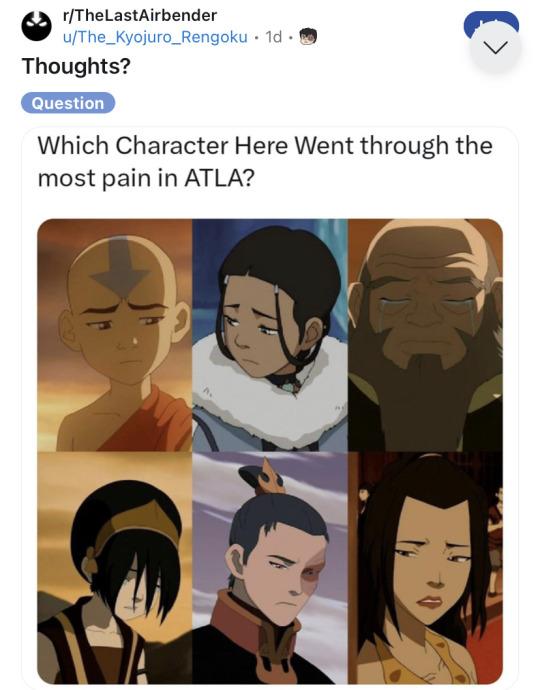
why are people even trying to debate this? literally only one right answer and that is just objective fact.
74 notes
·
View notes
Text
sokka hates the fire nation but nonetheless subscribes to their logic through internalizing his own dehumanization, albeit in the name of sacrificing what is necessary to resist imperialism. on the other hand, aang refuses to sacrifice his humanity, which is intrinsically tied to the culture that was deemed deserving of extermination, and by recognizing the fullness of his personhood and his intrinsic right to exist, he defeats the tenets of imperialism on an ideological battleground. that is why it is so crucial that aang’s influence over sokka, as an air nomad, and as someone who did not grow up under the looming shadow of colonialism and genocide, is what helps him regain the childhood he had forsworn in the name of war—his laughter, his joy, and his humanity.
#aang&sokka#aang#sokka#obviously aang performs this function for every principal member of the gaang#with katara it’s immediate (see: penguin sledding 5 minutes after meeting)#and with toph it’s less pronounced (id argue that sokka is more crucial to tophs process of valuing her humanity than aang although aang#lays the groundwork for it by being the one to recognize her potential)#and with zuko he has also been dehumanized by the fire nation but like. it’s not the same of course#whereas sokka and aang have largely been dehumanized in the same way#as victims of genocide#and obviously katara too#but katara has the same viewpoint as aang from the beginning#that she deserves to exist and fights for her cultural values#whereas sokka thinks that KATARA deserves to exist. that everyone does EXCEPT himself#so aang’s influence reminds him that he’s NOT uniquely disposable/sacrificial/unworthy#he’s a person too!#and he does so through the simple bond of friendship. through joy & laughter & fun#the values that were instilled into him by the air nomads#and it’s not like sokka COMPLETELY internalizes it#or that aang is the only one who attempts to impart this lesson#but it’s why their friendship is so important#because sokka accepts imperialist logic and aang refuses to#aang’s importance cannot be overstated#which is kind of funny to say bc he is the protagonist. the titular role#but ppl like to ignore that#which is crazy . but whatever
557 notes
·
View notes
Text
youtube
Watch the American Climate Leadership Awards 2024 now: https://youtu.be/bWiW4Rp8vF0?feature=shared
The American Climate Leadership Awards 2024 broadcast recording is now available on ecoAmerica's YouTube channel for viewers to be inspired by active climate leaders. Watch to find out which finalist received the $50,000 grand prize! Hosted by Vanessa Hauc and featuring Bill McKibben and Katharine Hayhoe!
#ACLA24#ACLA24Leaders#youtube#youtube video#climate leaders#climate solutions#climate action#climate and environment#climate#climate change#climate and health#climate blog#climate justice#climate news#weather and climate#environmental news#environment#environmental awareness#environment and health#environmental#environmental issues#environmental justice#environment protection#environmental health#Youtube
11K notes
·
View notes
Text
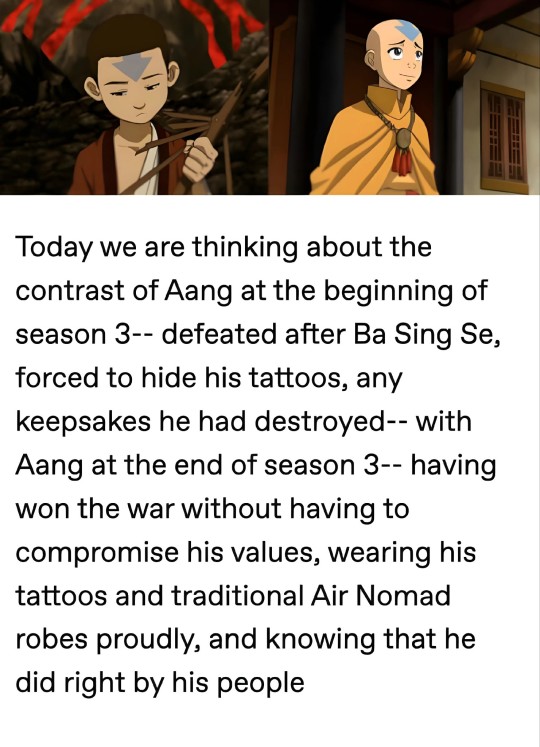
Ok i'm crying bye
149 notes
·
View notes
Text
The Good & the Bad: On Aang (Not) Killing the Fire Lord

I recived this asks forever ago, trurly sorry anon, but I'll keep my apologises for the end. I'd love to answer that!
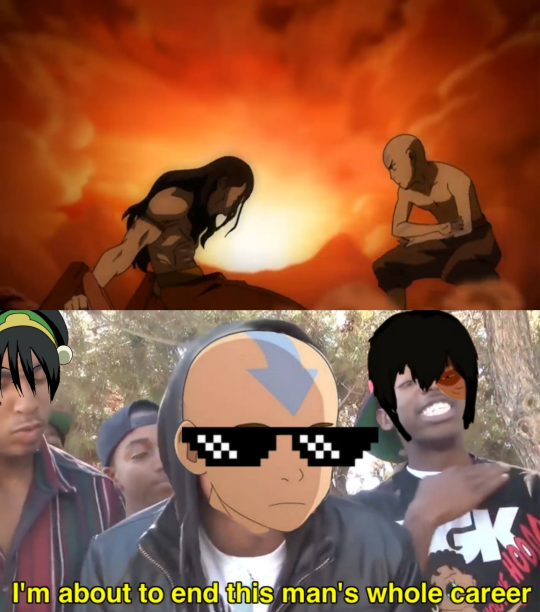
If you're asking me, this is way better than """killing him""". Case closed.
Getting this cleared up: The show didn't say that Aang is morally superior for this. It was solely about staying true to himself. Not a moral high ground.
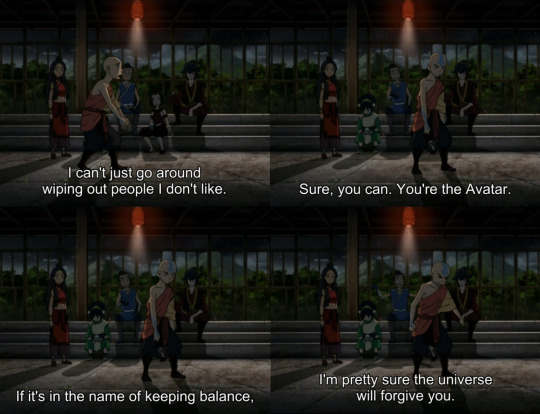
So when I hear people say it's problematic because it implies that sparing imperialistic dictators has some intrinsic goodness to it, (Ahem-Lily Orchard), I just can't agree. It was never about universal ethics, it was about Aang's culture and values.
Why Is This a Good Thing?
Aang loves his culture, and takes a lot of pride in it and its values. (See: in The Southern Raiders his first go-to to convince Katara to spare Yon Rah is his culture, rather than what such act would do Katara herself). He would have been ashamed if he had broken them. But right now they clash with his Avatar duties, with god-knows how many lives at stake. He needs to let go of his pride & shame, and become humble.
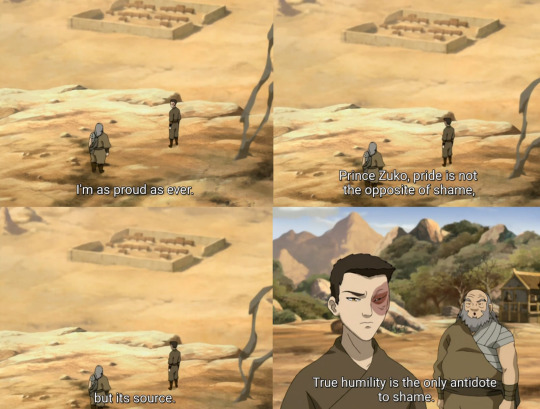
Just like Zuko humbling himself to the GAang before they accept him, or Sokka humbling himself to the Kyoshi warriors and Master Piandao, Aang could only speak to the the lion turtle after he'd given up, after he was humbled.
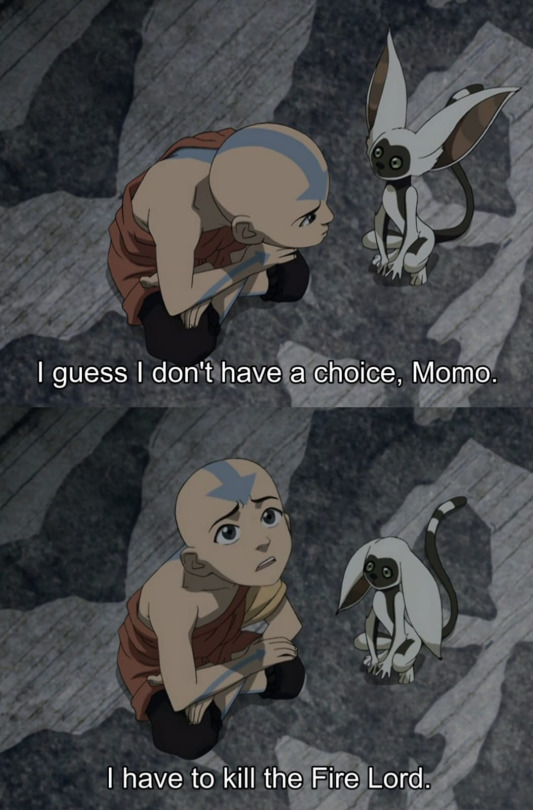
Even beyond Aang, it enhances the show's themes at large. A theme in A:TLA is paving your own path, and that you can do what you want despite the pressure. Your true destiny will come, you might be surprised by it, but it's yours and you're free to carve it.
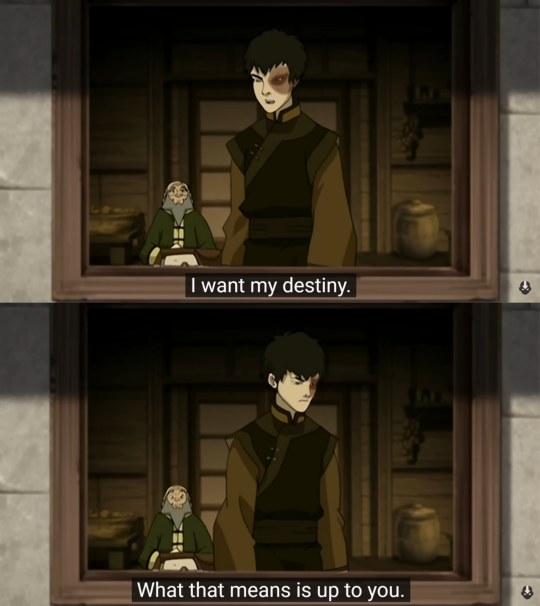
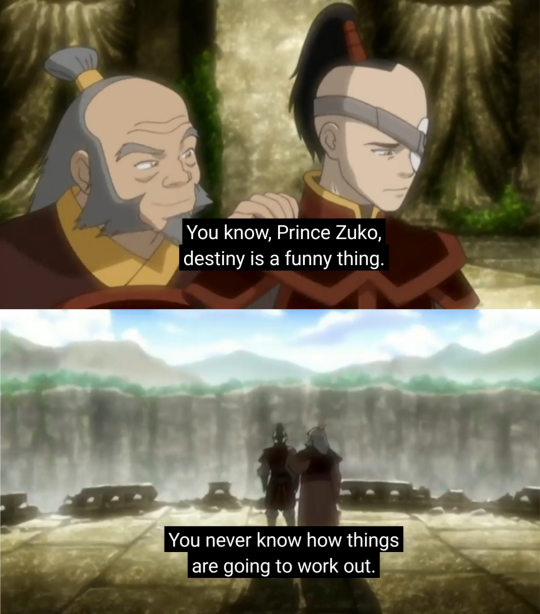
You just have to keep going, to continue to do the right thing, and your destiny will find you. Things have a way of working out in the end, eventually.
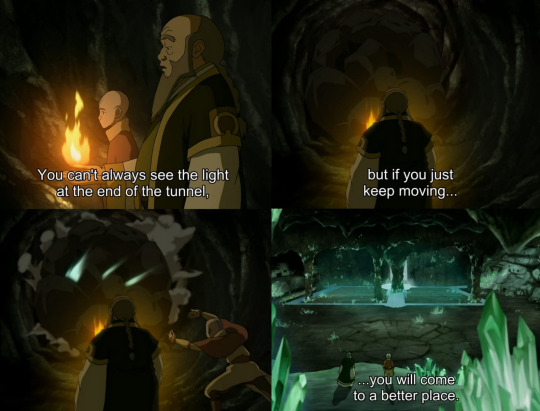
Sparing Ozai serves the theme, thus the show overall. Everyone told him it's his destiny to kill the Fire Lord and end the war. But he didn't agree, paving his own path, his own destiny, and all was well. The pieces fell in their place.
It is s amplified by the fact that if you read between the lines, he actually did follow all the previous Avatars' wisdom besides Yangchen's.
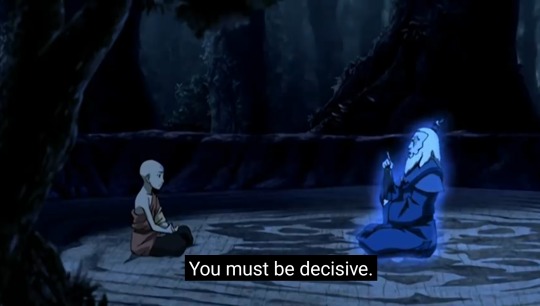
Aang knew what he wanted from the start. He isn't going to kill the Fire Lord. People (rightfully) tried to pressure him, but in the end, he stuck to his decision.
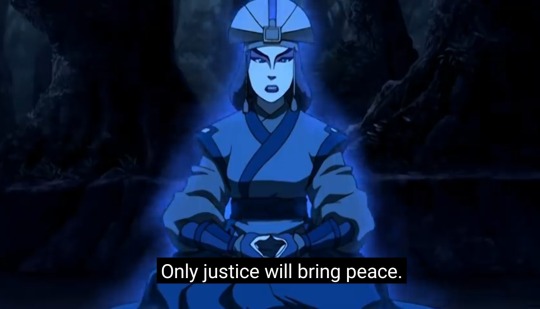
Justice was served. Aang took his bending away and put him to rot in prison for the rest of his life. There's more than one way to execute justice.
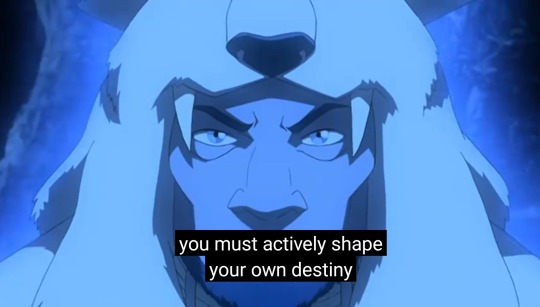
"... and the destiny of the world". That's exactly what Aang did. He followed his own path (staying true to himself) while saving the world (ending Ozai regime).
So that leaves us with Yangchen's advice. The one he didn't follow:
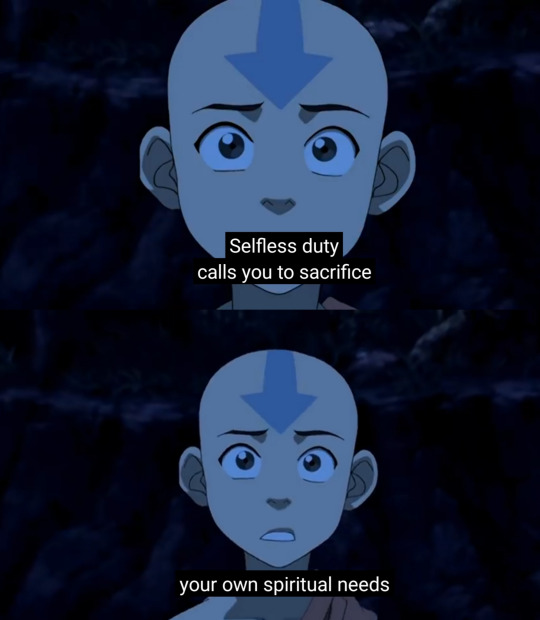
This opens another layer to this. Why doesn't Aang take the advice of a fellow Air Nomad? The one he should relate to the most? Because despite both being Avatars and Airbenders, Aang is the last. They're not the same. Yangchen is speaking from a place of privilege. She can carry the weight of the Avatar and not worry about the Air Nomads. Notice the wording: "spiritual needs". But it's deeper than that. In her time, they were there, they'll preserve their culture and values. Aang doesn't have that.
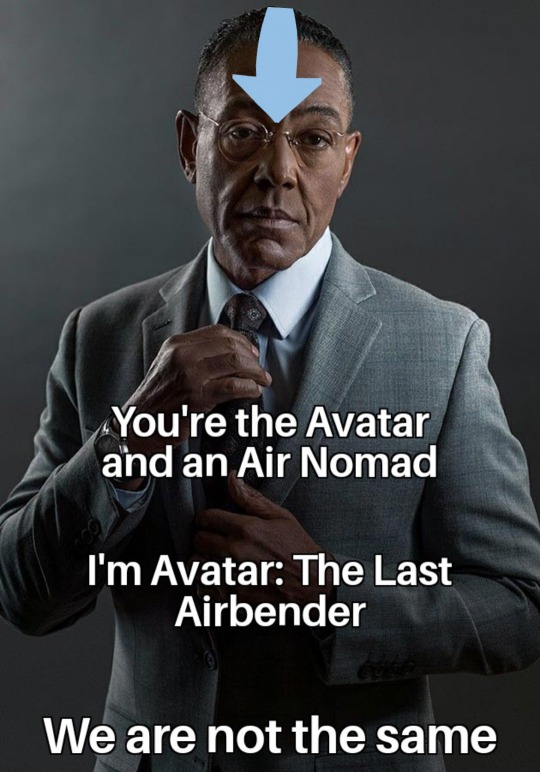
He's Avatar: The Last Airbender. He has both weights to carry. The decision to spare the Fire Lord, while protecting the rest of the world, is embedded in the show's title.
There's also something so incredibly powerful in Ozai being defeated specifically with Air Nomad values. A 100 years ago, during Sozin's Comet, the Fire Nation started the war by genociding them. When it comes back, the Avatar, the last Air Nomad, ends the war and stops the next genocide while preserving their values. The Fire Nation isn't going to push him to taint (one of) the last living aspacts of the Air Nomads, and Aang is shouting it – in the very same day the disaster occurred.
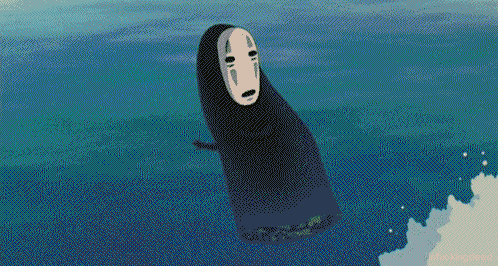
(Additionally I view this as a land mark of his character development since Siege of the North. He used spirit powers for murder, now he's using them for mercy).
(A:TLA is also a show made with kids in mind. They may not be able to make Aang kill Ozai. He got his bending stolen and sentenced to prison for the rest of his life. That's a more than serviceable punishment for a show aimed at kids).
(Ps: If Ozai had died Zuko would never have found out where his mother is).
The concept is fantastic. Nothing wrong there. But now, it's time for the critisism.
What's the problem then?
Despite looking in internet forums, it's entirely possible that I missed some things. With that being said, the Lion Turtles could have been foreshadowed better. As I stated, I don't mind it. But as far as I recall, it was foreshadowed once in The Library, and that's it. (Edit: It's also foreshadowed in Sokka's Master, but the point still stands).
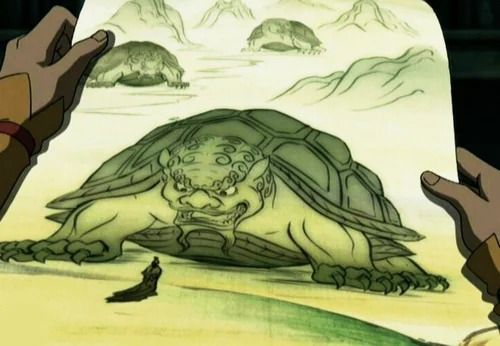
The Lion Turtle is a twist, it subverted expectations, but that doesn't mean it has to be a deus ex machina. That's what foreshadowing is for. It's the literary device to making a plot twist feel believable. The result is many fans, including me, feeling as though it came out of no where, even though it didn't.
Overall, I love that Aang spared Ozai. It ties into the themes of the show and Aang's role as the last airbender. It makes perfect sense, it's rather beautiful. However, I do wish the foreshadowing was better.
And for Anon, to apologize for the wait, I dedicate you this meme:
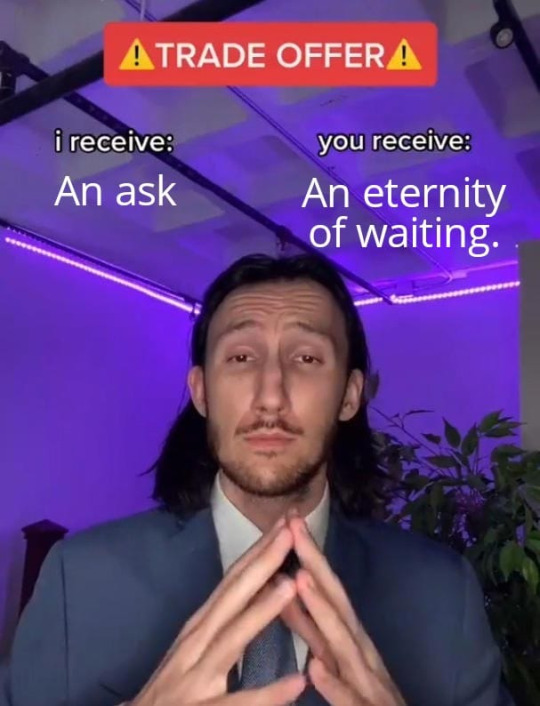
#tw genocide#aang#avatar aang#lion turtle#ozai#fire lord ozai#atla meta#avatar meta#aang meta#atla ending#atla finale#avatar: the last airbender#avatar the last airbender#air nomads#yangchen#kyoshi#roku#kuruk#avatar yangchen#avatar kyoshi#avatar roku#avatar kuruk#tw imperialism#avatar the last airbender meta#atla analysis#aang analysis#atla aang#atla critisism#iroh#uncle iroh
145 notes
·
View notes
Text
the reason people get mad and upset over aang not killing ozai is because they can’t or are unwilling to understand what it really meant for him to be the last airbender
a lot of people don’t truly acknowledge what aang went through when they talk about him. it was a genocide. an ethnic cleansing. a GENOCIDE. and i think that’s because so many people are just incapable or unwilling to wrap their heads around how tragic and isolating and unchangeable something like that is.
i’ve seen countless people say they wish aang had found other airbenders hiding away somewhere. and while i totally get wanting that to happen for the happiness of the character (hell, even i have thought about how heart wrenching that utter relief would feel for him), i’ve also seen those takes associated with people saying they just find it hard to believe that none of the airbenders survived. that none of them were able to escape.
and that’s the thing that annoys me because genocide is a real fucking thing that has happened and IS currently happening in the world (just look at palestine, congo, sudan). it shouldn’t be so hard for people to suspend their belief into thinking it could happen in a fictional piece of media. this disbelief that a genocide can be real results in people being unable to fully sympathize with a character who is stated several times to be the definite, unchangeable sole survivor of his people’s genocide. and i’m not saying it’s wrong to want there to be airbenders who lived, but in canon it’s clear that none of them did. and the ones who did canonically escape were hunted and lured by the fire nation to their demise. and if we’re going to discuss characters and the intents behind their actions, aang’s character development is heavily, heavily heavily guided by his guilt and grief over his lost culture and people. but a lot of people still can’t wrap their heads around the canonical genocide he survived, meaning they can’t fully comprehend why aang would choose peace over a violent end. and considering atla is a western show with a largely western audience, its even more evident that this gap in people’s ability to understand and sympathize with aang is emphasized by their western intrigue toward violence. people don’t just misunderstand aang’s dilemma—they wanted him to kill ozai because seeing him do that would have been cool and interesting and satisfying.
but aang’s decision to spare ozai’s life was made due to his status as the last airbender. prior to meeting the lion turtle, i think it’s safe to say that he had resigned to what he had to do. that is to say, he was likely going to kill ozai despite the pain that was going to cause him. he was going to give up a part of himself, his humanity and the last remainings of his culture, to be the avatar the world needed. but he was then gifted the ability to energy bend, offering him, but not cementing, another option. aang still had the choice, and we saw in the fight that aang was so very close to killing ozai even with this new ability. but he couldn’t. because although killing ozai would have been a pretty justifiable thing to do, it would have fully finished off the air nomads. aang was the only living human who held onto their beliefs. if he were to push those values aside to end the war, the war would have ended the same way it started: with the death of the air nomads. and it may sound “cheesy” or overly dramatic or whatever to some people, but aang’s entire story arc has, arguably, been him trying to fit in a world that seemingly has no more room for the air nomads. not only is he 100 years in the future, but this future has none of his people around and war is everywhere. violence is basically required to survive. death is everywhere. greed has corrupted nations. everything the air nomads stood against made up this world, and aang, as the avatar, had no choice but to save it. for him to have given in to what everyone expected of him—violence—he would have ultimately eliminated air nomad values from the world. and the world would have not cared. aang’s victory would have been celebrated, but aang would have felt even more grief than before. he would have let himself and his people down. and balance would have never been achieved because the air nomads mattered. they were part of what kept the world going round. no matter how much the current world he was fighting for called for violence and death to achieve an end, the air nomads still had a voice through aang. they were still around because of aang. aang’s existence and dedication and love for his culture kept the genocide from being official.
and in my opinion, air nomadic values coming out victorious in a war that nearly wiped them clean (except for aang) is much more of a meaningful and satisfying ending than violence ending with violence.
and if you wanna call aang’s decision selfish, then fine. but i personally think it’s more selfish to expect a survivor of genocide to keep giving and giving and giving for a war that took his people from him until he has nothing left of himself to give. i think that is far more selfish. aang may be the avatar but he is also human. just as much human as his people were, and the leaders he was fighting against, and the millions of people he ended up saving, and just as deserving of having some sort of agency in the decisions he makes. call me crazy ig
#aang’s decision to spare ozai was the right decision and yall will never convince me otherwise#aang was a victim of this war and his people deserved to receive justice in a way they would have appreciated and advocated for#and if you wanna say it was selfish of him#then so what??#call me crazy but i think a 12 year old survivor of genocide is more than right to be selfish when confronting the man#whose forefathers took his people and culture from the earth#and who planned on giving that same fate to other nations of people#atla#avatar the last airbender#pro aang#aang defense squad#air nomads#airbenders#aang#avatar aang
60 notes
·
View notes
Text
I think an important change NATLA made was to show the Air Nomads before the genocide - in the canonical timeline, rather than just memories of them after we knew they were all dead.
There's a reason kid's shows find it very hard to get approved character deaths of people we met, got to know, THEN have them be killed off (see: Jet) - it's much more impactful than already knowing someone is dead and then being shown a memory of them.
In the animated version, the fate of the Air Nomads is a foregone conclusion: they are a dead culture that was simply destined to die. Seeing the Air Nomads before the genocide in the live-action really humanizes them to the audience and shows that they were a real, living and breathing culture - not just one fated to die.
When you show only the aftermath of a genocide, it's easy for people to file that culture and people away in their head as 'dead' and it feels…normal(?) that they no longer exist - I think it's so incredibly important to show that these people were not just text on a page in a history book, but real, living people who didn't deserve to die - their destruction isn't "just the way it is" but rather was forced on them by terrible, power hungry people - they didn't just 'stop existing', they were murdered.
In a young children's show, you can show the aftermath of a war, you can have people who died in the past, but it's very difficult to show someone alive and well (develop them as a character with a name and story and interactions with the main cast) and then kill them off - I honestly can't think of a character in the OG that died after we had known them while they were alive (other than bad guys) - even with Jet, they couldn’t explicitly say he died.
We can ASSUME characters like Hahn died, but they just get thrown off the screen and no one ever mentions them again - Yue 'dies', but not really - her soul floats up to the moon after kissing and saying goodbye to Sokka, so it's not really a traditional death kids could get scarred from.
In the animated series, Gyatzo is only seen through memories, we already know he's dead so there's no emotional shock
The live action was able to push past those age restrictions and show people alive and well and then show that their lives were ended as a calculated and purposeful action
#natla#natla spoilers#avatar the last airbender#atla spoilers#air nomads#atla netflix#atla live action#I know some people are saying showing it was 'gratuitous' but i think it's incredibly important to not 'sanitize' genocide
80 notes
·
View notes
Text
youtube
Watch the 2024 American Climate Leadership Awards for High School Students now: https://youtu.be/5C-bb9PoRLc
The recording is now available on ecoAmerica's YouTube channel for viewers to be inspired by student climate leaders! Join Aishah-Nyeta Brown & Jerome Foster II and be inspired by student climate leaders as we recognize the High School Student finalists. Watch now to find out which student received the $25,000 grand prize and top recognition!
#ACLA24#ACLA24HighSchoolStudents#youtube#youtube video#climate leaders#climate solutions#climate action#climate and environment#climate#climate change#climate and health#climate blog#climate justice#climate news#weather and climate#environmental news#environment#environmental awareness#environment and health#environmental#environmental issues#environmental education#environmental justice#environmental protection#environmental health#high school students#high school#youth#youth of america#school
11K notes
·
View notes